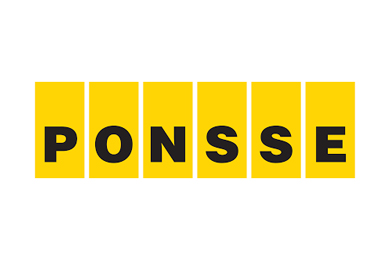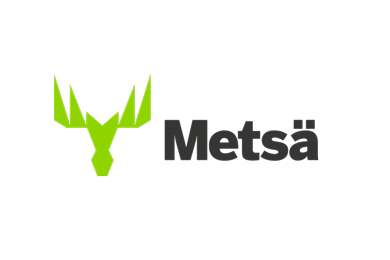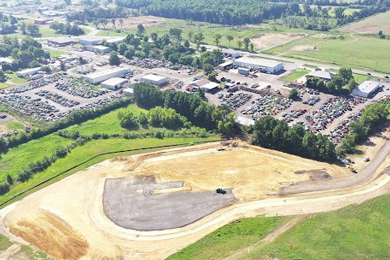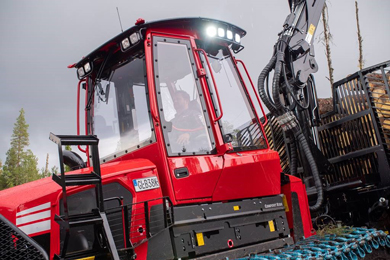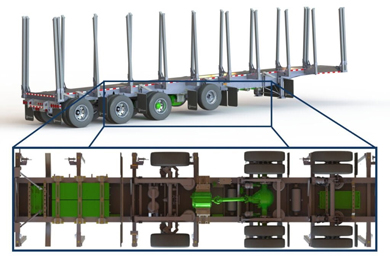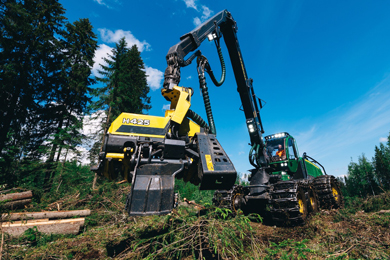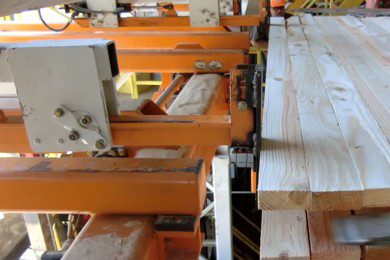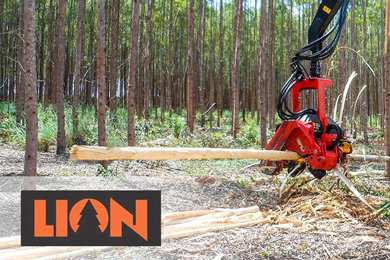Work is underway at the site in Russellville, Pope County in northwestern Arkansas, with commercial operations expected to begin at the plant in 2022. The move is part of a $40 million investment by Drax in the state, creating approximately 30 new direct jobs and many more indirect jobs across Arkansas.
Arkansas Secretary of Commerce Mike Preston said:
“The investment that Drax is making throughout Arkansas is proof that the state’s timber industry is poised for a bright future and is a great example of how a global economy works.”
“Through this partnership, these three Arkansas communities will experience further growth and opportunities, and Drax will be able to continue working toward its mission to provide renewable electricity for millions across the pond.”
The three pellet plants are expected to produce a total of around 120,000 metric tons of sustainable biomass pellets a year from sawmill residues, supporting the renewable energy company’s plans to increase self-supply to its power station in the U.K.
Russellville Mayor Richard Harris said:
“The construction and future operation of the Drax pellet plant in Russellville is certainly welcome news. On the occasion of this exciting announcement, I’d like to welcome Drax as a new partner in our community and thank them for the investment they are making in our community.”
The development of the “satellite” pellet plants, which are situated near sawmills, is part of Drax’s strategy to increase biomass self-supply to five million tons by 2027, improving supply chain resilience while reducing pellet costs.
Locating the plants near sawmills provides the satellite plants with a ready feedstock of sawdust and other residues left over when timber is processed, reducing emissions in the supply chain as well as reducing infrastructure, operational, and transportation costs.
Matt White, Drax Biomass Senior Vice President, said:
“Drax has made great progress in delivering our $40m investment in Arkansas, with the second of three satellite pellet plants now under construction.”
“The investments we’re making will bring jobs and opportunities to rural communities in Arkansas alongside supporting international efforts to tackle the climate emergency. These plants support Drax’s plans to develop bioenergy with carbon capture and storage – a vital negative emissions technology that will be needed around the world to meet net zero targets.”
Drax has transformed its power station in the U.K. to become the largest decarbonization project in Europe by converting it to use sustainable biomass instead of coal.
Earlier this year construction began at Drax’s first satellite pellet plant in Leola, Grant County, and commercial operations are expected to begin late this year. Progress is being made on selecting the third and final site.
Media contacts:
Annmarie Sartor
Communications Officer
E: annmarie.sartor@draxbiomass.com
T. 1-318-801-0046
Selina Williams
Media Manager
E: selina.williams@drax.com
T: +44 (0) 7912 230 393
Notes
- The sustainable biomass pellets produced at the new satellite plants will be transported to Bruce Oakley terminal in Little Rock, Ark. before being shipped south to Louisiana to oceangoing vessels.
- Each pellet plant is expected to produce 40kt per year, with the total cluster expected to produce120kt per year.
- The development of the three ‘satellite’ plants comes after Drax’s acquisition in April of 11 pellet plants across the USA and Canada, making it a world-leading biomass pellet production and supply business.
- Drax’s strategy is to reduce the costs of its pellets to £50/MWh by 2027.
- In 2020, around 43% of the material used in Drax Power Station’s pellets came from sawmill residues. The rest came from low-grade material such as treetops, limbs and misshapen and diseased trees not suitable for other use and thinnings – small trees removed to maximize the growth of the forest.
About Drax
Drax Group’s purpose is to enable a zero carbon, lower cost energy future and in 2019 announced a world-leading ambition to be carbon negative by 2030, using Bioenergy with Carbon Capture and Storage (BECCS) technology.
Its 3,400 employees operate across three principal areas of activity – electricity generation, electricity sales to business customers and compressed wood pellet production and supply to third parties.
For more information visit www.drax.com
Power generation:
Drax owns and operates a portfolio of renewable electricity generation assets in England and Scotland. The assets include the UK’s largest power station, based at Selby, North Yorkshire, which supplies five percent of the country’s electricity needs.
Having converted Drax Power Station to use sustainable biomass instead of coal it has become the UK’s biggest renewable power generator and the largest decarbonisation project in Europe. It is also where Drax is piloting the groundbreaking negative emissions technology BECCS within its CCUS (Carbon Capture Utilisation and Storage) Incubation Area.
Its pumped storage, hydro and energy from waste assets in Scotland include Cruachan Power Station – a flexible pumped storage facility within the hollowed-out mountain Ben Cruachan.
Pellet production and supply:
Drax owns and has interests in 17 pellet mills in the US South and Western Canada which have the capacity to manufacture 4.9 million tonnes of compressed wood pellets (biomass) a year.
The pellets are produced using materials sourced from sustainably managed working forests and are supplied to third party customers in Europe and Asia for the generation of renewable power.
Drax’s pellet mills supply around 30% of the biomass used at its own power station in North Yorkshire, England to generate flexible, renewable power for the UK’s homes and businesses.
Customers:
Drax is the largest supplier of renewable electricity to UK businesses, supplying 100% renewable electricity as standard to more than 370,000 sites through Drax and Opus Energy.
It offers a range of energy-related services including energy optimisation, as well as electric vehicle strategy and management.
To find out more go to the website www.energy.drax.com

